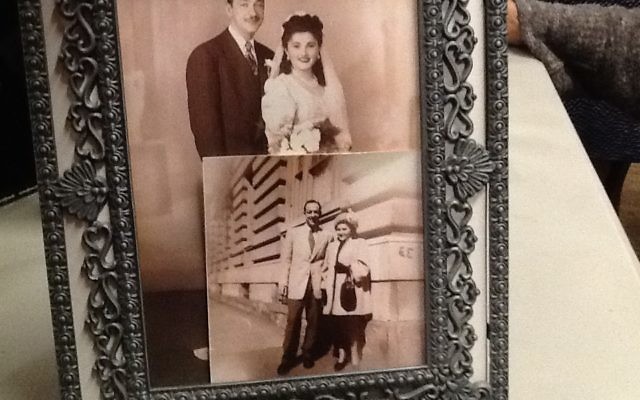Celebration of Survival in Peachtree City
By Vicki Leopold
The email went out at 11:55 a.m. Wednesday, May 4, with an apology.
Rabbi Yossi Lew explained that there had been no certainty until that moment, but, yes, that night Helen Gerson, 88, a survivor of the Lodz Ghetto, Auschwitz and Bergen-Belsen, would arrive with her daughter to address residents of Peachtree City on Yom HaShoah.

“It would be doubtful that this could happen again in Peachtree City,” the Chabad of Peachtree City rabbi’s email read.
By 7 p.m., a small, mostly Jewish crowd had gathered at the Chabad house to meet Gerson and daughter Rhoda Gleicher, a history teacher for over 20 years at Torah Day School of Atlanta.
Gerson, a petite, attractive woman with a ready smile and bright eyes, relayed a story of horror and survival.
She was a young girl when her father, a renowned pattern maker, was advised to leave home for a safer place. They moved to Lodz, Poland, where her father was employed by the Nazis to make uniforms for German soldiers. Her job was stuffing hay into the boots of the soldiers.
Eventually, the ghetto was emptied; Gerson and her family were shipped to Auschwitz. Josef Mengele sent her healthy family to the right and the youngest, Helen, to the left, but when the doctor of death looked away, the teenager ran from her line and joined her family.
Gerson remembers always being hungry and receiving hot water with a peel of potato for soup. Once a guard was kind to her, brought her to the kitchen, and gave her bread and sausage. She hid the food to bring to her father, aunt, sister and cousins. Each person received a morsel and was thankful.
Gerson worked in the garden picking vegetables for the soldiers after being moved to Bergen-Belsen in Germany. Once she hid a small carrot in her dress. An older female guard noticed the carrot in the dress and punched her in the mouth, knocking out a front tooth.
“See, I got a new one,” Gerson said, smiling.
The camp was liberated by the British in spring 1945. She remembers a tank rolling in and German officers walking alongside with their arms tied behind their backs. The older prisoners said it must be a trick, but a young British officer came out of the tank and said, “You are all free; you can go.”
Still no one moved. Finally, the officer, speaking Yiddish, pulled out his Star of David and said, “Look, I am Jewish too; you are all free.” Then they believed.
Some prisoners dug up what dirt they could and threw it at the Germans, who had switched from captors to prisoners.
In 1946, Gerson, 17, and the surviving family moved to New York to join an uncle.
Rabbi Lew called Gerson a hero. Not only did she survive the Holocaust, but she also rebuilt her Jewish life with children and grandchildren.
Gleicher said each person at the event was now a witness to the Holocaust.
Another Yom HaShoah commemoration happened Sunday, May 1, at Christ Our Shepherd Lutheran Church. For 14 years Congregation B’nai Israel and Christ Our Shepherd have joined to remember the Holocaust, each year alternating venues.
The service consisted of prayers, candles, songs and poems. Rabbi Rick Harkavy and Cantor Susan Burden joined Pastors Miriam Beecher and Fritz Wiese in sharing thoughts and inspirational messages.
The highlight of the service was a short documentary, “Fate Did Not Let Me Go,” about a farewell letter Valli Ollendorff wrote to her only surviving son in the United States from the Theresienstadt concentration camp. This mother’s letter of love and hope arrived mysteriously from South America in 1985 when her son was 79.
Coming from a family of doctors, the son had become a top eye surgeon in New York. Upon his death, the family released the letter. In December 2007, Yad Vashem premiered the documentary with Ollendorff family members present.





comments